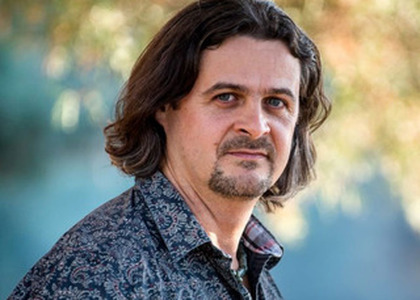> [Archived] Interviews

Interview with conductor Cristian Oroșanu
The Radio Music Season continues on Friday, April 5th, with a symphonic vocal concert performed by the National Radio Orchestra and the Academic Radio Choir, prepared by Ciprian Țuțu. On this occasion, conductor Cristian Oroșanu returned to lead the Radio ensembles, and he spoke about it in an interview with Ioana Țintea.
Mr. Cristian Oroșanu, you will be conducting Three Pieces op. 4 no. 2 for string orchestra by Constantin Silvestri at the opening of the concert at Sala Radio, commemorating the composer's 111th birthday this year. What is the reason behind this choice?
This is one of the Romanian pieces that I greatly appreciate; I have conducted it several times. I love it very much; it has a lot of spirit and is usually performed with a chamber orchestra. This time, I would like to use a larger ensemble, considering that we have a concert with the National Radio Orchestra, and the sonorities in this piece are written extensively, in divisions, meaning in separate parts and on multiple voices. It fits very well with a larger ensemble, and that's why I want to make this experience enjoyable.
Therefore, it also represents a challange for the instrumentalists.
It is not an easy piece, but not too hard either, but it has a lot of special effects. I really appreciate it and I want to conduct it again. I think the orchestra had perfomed it before, but not under my baton. I conducted it together with other chamber ensambles, as I said before, and this time I want it to be performed with a larger orchestra.
At the heart of the program is Camille Saint-Saëns' Violin Concerto No. 3 in B minor for violin and orchestra, an opus that you conducted last year on this stage with Ioana Goicea as the soloist.
Yes, it so happened that one season after another, this concert came into play.
The soloist on Friday, April 5th will be Gabriel Croitoru. Considering the numerous collaborations you've had, how would you describe the artistic relationship you have and how did it evolve over time?
We have a special relationship. We have known each other for a very long time. We were still students when I conducted the first concert with him as a soloist. It was at the "Young Conductors' Festival" in Bușteni, and that's when we first performed together in a concert. I remember it vividly; it was Stravinsky, a very challenging piece. Our artistic partnership has endured over time, consistently resulting in successful and harmonious performances.
The evening at Sala Radio Hall will be finished by another French piece, this time from the realm of symphonic vocal literature, Gabriel Fauré's Requiem op. 48, featuring soprano Veronica Anușca and baritone Balla Sandor as soloists. How would you describe this opus in broad lines?
It is one of my favorite requiems. I believe it is, I could say, the most serene among all the music composed on this requiem text. I love this piece very much, and I was delighted that Easter falls around this time in the Catholic calendar, allowing us to schedule this piece. I truly cherish this composition.
After this concert at Sala Radio, how does you schedule looks like?
I'm looking forward to organizing the third edition of the International Orchestra's Conductor Competition, this new concept of mine, where the orchestra selects its laureates through a democratic voting process. This project will take place in Oradea Philharmonic in just a month, and I'm pleased to discuss it with you.
Translated by Georgiana Morozii,
University of Bucharest, Faculty of Foreign Languages and Literatures, MTTLC, year II
Corrected by Silvia Petrescu














